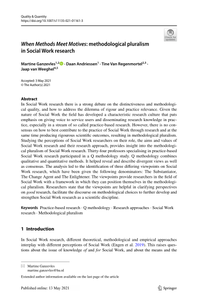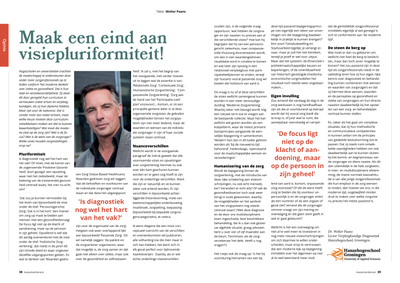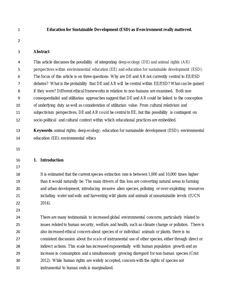In Social Work research there is a strong debate on the distinctiveness and methodological quality, and how to address the dilemma of rigour and practice relevance. Given the nature of Social Work the field has developed a characteristic research culture that puts emphasis on giving voice to service users and disseminating research knowledge in practice, especially in a stream of so called practice-based research. However, there is no consensus on how to best contribute to the practice of Social Work through research and at the same time producing rigourous scientific outcomes, resulting in methodological pluralism. Studying the perceptions of Social Work researchers on their role, the aims and values of Social Work research and their research approach, provides insight into the methodological pluralism of Social Work research. Thirty-four professors specialising in practice-based Social Work research participated in a Q methodology study. Q methodology combines qualitative and quantitative methods. It helped reveal and describe divergent views as well as consensus. The analysis led to the identification of three differing viewpoints on Social Work research, which have been given the following denominators: The Substantiator, The Change Agent and The Enlightener. The viewpoints provide researchers in the field of Social Work with a framework in which they can position themselves in the methodological pluralism. Researchers state that the viewpoints are helpful in clarifying perspectives on good research, facilitate the discourse on methodological choices to further develop and strengthen Social Work research as a scientific discipline
DOCUMENT

This paper argues that there is a need for a dialogical learning space because soft skills are becoming increasingly important in an ever more unstable labour market. Where once a monological form of education worked to prepare youth for the future, now a dialogue is required. This dialogue, by definition or in the first place seek consensus, but assumes pluralism and even conflict and is thereby intended to be a true departure from the monological nature of education.
DOCUMENT

As multifunctional places that combine shopping and hospitality with public space and residential functions, urban consumption spaces are sites where different normative orders surface and sometimes clash. In Amsterdam, such a clash emerged over touristification of consumption spaces, eroding place attachment for local residents and urging the city government to take action. Based on policy analysis and interviews with entrepreneurs and key informants, we demonstrate how Amsterdam’s city government is responding to this issue, using legal pluralism that exists within formal state law. Specifically, the city government combines four instruments to manage touristification of consumption spaces, targeting so-called tourist shops with the aim to drive them out of the inner city. This strategic combination of policy instruments designed on various scales and for different publics to pursue a local political goal jeopardizes entrepreneurs’ rights to legal certainty. Moreover, implicitly based on class-based tastes and distrust towards particular minority groups of entrepreneurs, this policy strategy results in institutional discrimination that has far-reaching consequences for entrepreneurs in itself, but also affects trust relations among local stakeholders.
DOCUMENT

Postdisciplinarity makes claims on ontological, epistemic, and methodological levels, but it is inevitably a personal philosophical stance. This article represents an existentialist approach to the discourse on postdisciplinarity, offering reflective narratives of three academics. Tomas Pernecky discusses creativity, criticality, freedom, and methodological and epistemic pluralism; Ana María Munar reveals her journey of epistemological awakening; and Brian Wheeller underscores the importance of researchers' subjective and emotive voice. Jointly, the authors depict postdisciplinarity as an invitation to conceptual and interpretive eclecticism, critical analysis, and creative problem solving.
MULTIFILE
Hogescholen en universiteiten trachten de maatschappij te ondersteunen door onder meer zorgprofessionals op te leiden conform ‘het moderne denken’ over ziekte en gezondheid. Dat is hun taak en verantwoordelijkheid. Zij doen dit door geregeld hun curriculum te vernieuwen zodat artsen en verpleegkundigen, als zij hun diploma hebben, klaar zijn voor de toekomst. Dat is zonder meer een nobel streven, maar welke keuze moeten deze curriculumontwikkelaars maken om dat te kunnen bewerkstelligen? Wat moet die moderne visie op de zorg zijn? Wat is de focus? Wat is de wens van de zorgvrager? Welke visies houden zorginstellingen erop na?
DOCUMENT

LINK
Collaborative governance (CG) is becoming the common currency of decision-making, able to surmount existing institutional constraints to effectively address challenges related to sustainability and social and environmental corporate behavior. CG approaches may however result in institutional complexity. As an illustration of CG in the domain of corporate social responsibility (CSR), the ISO 26000 standard is a legitimate point of reference for organizations worldwide. The standard represents a pluralistic institutional logic that resonates several tensions arising from the domain it tries to standardize, the nature of its development process, its interpretation of CSR and the type of standard it represents. This article aims to identify and examine strategic responses to ISO 26000 by various standards-related organizations (including national standardization institutes, certification organizations, and service providers) and to contribute to the understanding of strategic responses of organizations to pluralistic institutional logics that result from CG.
LINK
This article focuses on the role of ethical perspectives such as deep ecology and animal rights in relation to environmental education, arguing that such perspectives are well-placed to reposition students as responsible planetary citizens. We focus on the linkage between non-consequentialism, animal rights, and deep ecology in an educational context and discuss the broader issue of ethics in education. Finally, we discuss how the inclusion of deep ecology and animal rights perspectives would improve current environmental education programs by deepening the respect for nonhumans and their inclusion in the ethical community. https://www.linkedin.com/in/helenkopnina/
DOCUMENT

Europe is on the path, though rocky, to political and cultural unity. After World War II, relatively large numbers of immigrants moved to Europe and brought with them outside cultural customs and religions. The issue of multiculturalism in society has been on the political agenda for decades, but attitudes have changed drastically since 11th September 2001. Attitudes in relation to migrants, particularly those with a Muslim background, have become more wary and critical. Islam has become associated with violence and terrorism and fears have grown that migration exacerbates this threat to society. These societal developments pose a threat to intercultural education. This article explores the societal situation in the Netherlands and Germany using empirical data and elaborates how youth in the Netherlands and Germany evaluate their relationship with migrant, especially through the dimension of religious tolerance and acceptance.
DOCUMENT

This article discusses the possibility of integrating deep ecology (DE) and animal rights (AR) perspectives within environmental education (EE) and education for sustainable development (ESD). The focus of this article is on three questions: why are DE and AR not currently central to EE/ESD debates? What is the probability that DE and AR will be central within EE/ESD? What can be gained if they were? Different ethical frameworks in relation to non-humans are examined. Both non-consequentialist and utilitarian approaches suggest that DE and AR could be linked to the conception of underlying duty as well as consideration of utilitarian value. From cultural relativism and subjectivism perspectives, DE and AR could be central to EE, but this possibility is contingent on socio-political and cultural context within which educational practices are embedded. https://doi.org/10.1016/j.envdev.2014.09.001 https://www.linkedin.com/in/helenkopnina/
MULTIFILE
